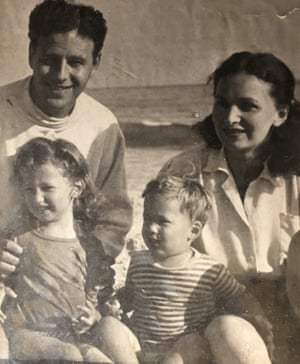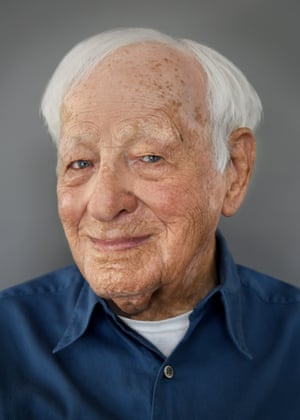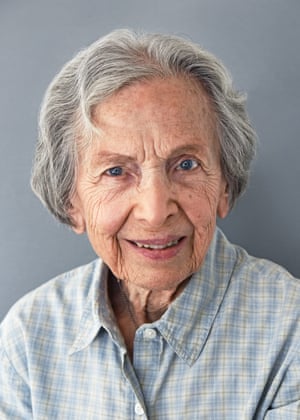'People will forgive you for being wrong, but they will never forgive you for being right - especially if events prove you right while proving them wrong.' Thomas Sowell
Search This Blog
Showing posts with label vegetable. Show all posts
Showing posts with label vegetable. Show all posts
Sunday, 12 June 2022
Saturday, 11 February 2017
The 100-year-old couple – still married, still going strong
Paul Laity in The Guardian
We don’t know anyone else over 100. We are really oddities: two people married for 78 years, one 103, the other 100. We’ve outlived everybody. And it’s rare, I recognise that. We’re very lucky. The best I can wish you is our luck.”

Morrie Markoff is sitting on the sofa in his downtown Los Angeles apartment next to his wife, Betty. They are delighted that someone from the “Manchester Guardian” has come to talk to them, though these days they are used to a degree of attention. When Morrie was 100, a gallery in the city put on his first art show, exhibiting his scrap-metal sculptures, photographs and paintings. “Ease up on the 100 business,” he remarked at the time. “I’m trying to pass as 90.” Now the Markoffs are to appear in Aging Gracefully, a book of photos of centenarians by Karsten Thormaehlen; they are the only married couple in its pages.
We don’t know anyone else over 100. We are really oddities: two people married for 78 years, one 103, the other 100. We’ve outlived everybody. And it’s rare, I recognise that. We’re very lucky. The best I can wish you is our luck.”

Morrie Markoff is sitting on the sofa in his downtown Los Angeles apartment next to his wife, Betty. They are delighted that someone from the “Manchester Guardian” has come to talk to them, though these days they are used to a degree of attention. When Morrie was 100, a gallery in the city put on his first art show, exhibiting his scrap-metal sculptures, photographs and paintings. “Ease up on the 100 business,” he remarked at the time. “I’m trying to pass as 90.” Now the Markoffs are to appear in Aging Gracefully, a book of photos of centenarians by Karsten Thormaehlen; they are the only married couple in its pages.
“We’ve been together for nearly eight decades, and we still haven’t killed each other!” Morrie says.
“Though we’ve tried a few times,” chimes in Betty. “We’ve had plenty of run-ins, oh my God … but he never hit me, and I never hit him. Though I think I pushed him once.”
In turn, Morrie jokes about trading her in for two 50-year-old women. But whatever arguments they had are a thing of the past. “Now it’s peaceful,” Betty says, her hand touching the back of Morrie’s neck. She dismisses any idea of there being a secret to making a marriage work so long. “Just don’t let every complaint turn to anger. Tolerance and respect. And you’ve got to like them. Morrie would never use the word love; I do, but the actions are the same on either part.”
Why not the word “love”? Morrie replies that “to me, love is possessive; it’s controlling and demanding. The word that I would rather use instead is ‘caring’. You care about people. ‘Care’, to me, has a much deeper meaning. Love is an esoteric word, but one that people also use to mean all sorts of off-hand things. ‘I love playing tennis,’ and such. I hug Betty constantly, I kiss her constantly, I care very much about her.” Morrie assures me that the day they got together was the most fortunate of his life.
They met in New York City in 1938, at the wedding of Betty’s cousin, who happened to be the brother of one of Morrie’s friends. Betty was sitting at the table on Morrie’s left. “On my right,” he picks up the story, “was Rose Lebovsky, a very pretty girl, sophisticated, with wealthy parents. Betty has asked: why did you pick me? And I say: it’s because you ate less.”
Betty’s friends were unsure about the charming machinist, who had grown up in a tenement in East Harlem. But she let him drive her back home to College Point, in Queens.
“He was so handsome, with curly black hair. And on one of our first dates, the car broke down and he fixed it quietly and uncomplainingly, just like that. No fuss, unlike other men. I was impressed. And,” she repeats, “he was so handsome.” What else appealed to you, I ask: his sense of humour? She looks doubtful. “Er, yes, well, I guess so!”
“Though we’ve tried a few times,” chimes in Betty. “We’ve had plenty of run-ins, oh my God … but he never hit me, and I never hit him. Though I think I pushed him once.”
In turn, Morrie jokes about trading her in for two 50-year-old women. But whatever arguments they had are a thing of the past. “Now it’s peaceful,” Betty says, her hand touching the back of Morrie’s neck. She dismisses any idea of there being a secret to making a marriage work so long. “Just don’t let every complaint turn to anger. Tolerance and respect. And you’ve got to like them. Morrie would never use the word love; I do, but the actions are the same on either part.”
Why not the word “love”? Morrie replies that “to me, love is possessive; it’s controlling and demanding. The word that I would rather use instead is ‘caring’. You care about people. ‘Care’, to me, has a much deeper meaning. Love is an esoteric word, but one that people also use to mean all sorts of off-hand things. ‘I love playing tennis,’ and such. I hug Betty constantly, I kiss her constantly, I care very much about her.” Morrie assures me that the day they got together was the most fortunate of his life.
They met in New York City in 1938, at the wedding of Betty’s cousin, who happened to be the brother of one of Morrie’s friends. Betty was sitting at the table on Morrie’s left. “On my right,” he picks up the story, “was Rose Lebovsky, a very pretty girl, sophisticated, with wealthy parents. Betty has asked: why did you pick me? And I say: it’s because you ate less.”
Betty’s friends were unsure about the charming machinist, who had grown up in a tenement in East Harlem. But she let him drive her back home to College Point, in Queens.
“He was so handsome, with curly black hair. And on one of our first dates, the car broke down and he fixed it quietly and uncomplainingly, just like that. No fuss, unlike other men. I was impressed. And,” she repeats, “he was so handsome.” What else appealed to you, I ask: his sense of humour? She looks doubtful. “Er, yes, well, I guess so!”

Morrie and Betty with their children, Judith and Steven in the 1940s.
The dating didn’t last long; Morrie left the East Coast and returned to California, where he had lived for some time having taken a road trip there with friends and fallen in love with the sunshine and easy atmosphere. Was it a memorable marriage proposal? “Oh hell no,” Betty replies. “He never proposed. He just asked: would you like to live in California?”
Morrie sent her the fare for the bus, and picked her up in LA after the four-day journey. They “found a rabbi in our price range” and had a simple ceremony, during which the rabbi said: “May the marriage be as pure as the gold in the ring.” Betty and Morrie “looked at each other and almost burst into laughter” – they had a fake gold ring bought at Woolworths.
For Betty, LA is a fabulous city. “You’ve got the beach, the mountains, and the climate is so nice; I think it’s like paradise.” She shows off the one-room condo where they’ve lived for five years, since moving out of their much-loved modernist home a few miles away. The flat is decorated with Morrie’s artwork, most of it from the 1950s and 60s. There’s a view of blue skies and Bunker Hill skyscrapers; Frank Gehry’s Walt Disney Concert Hall, with its luminous swoops and curves, is almost next door.
Betty says that old age for her has meant a great loss of energy: “My walking isn’t good, and I get confused.” These days, Morrie uses a mobility scooter. “He can’t forgive them for taking his car away,” says Betty. But they still go out for breakfast, and declining vigour is in part made up for by a sharpened appreciation of the world around them. Betty enjoys sitting outside a local cafe to see the play of sunlight and shadow, and likes to watch young children splashing in a nearby fountain, wondering which ones will brave the water, and which, too cautious, will turn away.
“I’ve lived a long life and a full one,” Morrie reflects. “I’ve never known a minute of boredom. I’ve always been busy, with work, or making things, or photography or travel, or most recently writing [he’s finished a memoir]. And there’s always another book to read. I sometimes say: I have so much to do, I don’t have time to die.”

Morrie Markoff. Photograph: Karsten Thormaehlen
The day before his 99th birthday, he did die, at least for a few moments. Having had a heart attack – “Betty acted quickly and dialled 911; she saved my life” – Morrie was undergoing an operation to put in a pacemaker when something went wrong and he flatlined. “The surgeons killed me – not a good idea as I have relations who are attorneys.” Apparently, his mouth fell open, his tongue dropped out and the grieving family retreated to the hospital’s meditation room – only to be called back a little later to find Morrie alive and joking.
“If I were a religious man, I’d put my longevity down to divine intervention,” Morrie says. “As I’m not, I simply say it’s luck.” Though the fact that his father, a very heavy smoker, died aged 94 suggests his genes aren’t bad.
Morrie’s early life was far from pampered. He remembers the tenement he grew up in as rat-ridden, with a kitchen filled with cockroaches and mattresses alive with bedbugs. Six people lived in three rooms; he slept on two chairs his mother put together, piled with cushions, in front of the stove. But he was never hungry, he insists, even in the Depression years, and was given complete freedom.
He remembers swimming naked as a boy in an East River that was full of floating rubbish, condoms, faeces and flotsam; he loved to dive off the flour barges tied to the dock. Perhaps he built up a great immune system, he wonders. And diet? He relishes the memory of hot dogs on Coney Island, with mustard and sauerkraut, washed down with Dr Brown’s celery tonic. Until he got tongue cancer, Morrie also smoked cigarettes, cigars and a pipe. When working as a machinist, he’d leave the cigarettes in his mouth because his hands were so oily; the smoke would fill his eyes, and in the morning he couldn’t open them.
Betty, on the other hand, puts her long life down to her “seventh grade nutrition class”. She was always aware of preparing a meal with protein and vegetables. Plus every morning for decades they’d walk the three miles or so around the local lake, before breakfast.
They always had energy, they insist, and boredom is not in the family. One of their early drives was politics. Morrie was a member of the Communist Party USA and would often go on protests; Betty was once put in prison for an hour for handing out its leaflets. But the aim was never an overthrow of government, just a fairer society. They were devotees of Roosevelt and even more enthusiastic about Barack Obama. As for Trump: “In my lifetime, he’s the oddest person to be elected president … he’s an egomaniac, a wildcard, a casino-owner: how much tax does he pay?”
“He’s so prejudiced,” Betty adds.

Betty Markoff. Photograph: Karsten Thormaehlen
Politics spawned friendships, and they had a close circle when bringing up their two kids, Judith and Steven. (One odd thing about getting to a very advanced age, Betty has said, is seeing your children becoming senior citizens.) The LA house they lived in for decades was part of a progressive housing co-operative; it was designed as a community, and its residents were in and out of each other’s houses all the time. “The friends are not there any more … they are long since gone,” Betty says. I ask her how that feels. She’s quiet but brisk in reply: “Oh, I’m very adaptable.”
After the war, during which he was deferred from the army to make detonators and contour rockets, Morrie ended up owning his own appliance shop. He used the scrap metal from air-conditioner repairs to make the small, dynamic sculptures that were exhibited decades later. But then a passion for travel and photography took over, and Morrie and Betty shine a bit more brightly when remembering their camping trips and tourist escapades. The photos they show me of their trips around the world, from Mexico to Macau, are of an astonishing quality. What camera did you use, I ask? Morrie begins to enthuse about his Rolleiflex and Leica, before Betty groans and changes the subject.
She is clearly proud of him, however. “He’s very talented in lots of directions,” she says in a moment when he’s not around. “If he had grown up differently, who knows what he might have achieved?”
Morrie still feels his days are not long enough, and insists you don’t need much money to live an active and involved life. Their daughter lives in the next building, so even the death of one of the couple won’t spell utter loneliness. Yet again, he mentions their luck.
As I prepare to leave, he chides me mischievously: “You haven’t asked us about our sex life!” Then he laughs: “that’s just a memory”. With his hand on Betty’s knee, Morrie looks at the woman whom he has never told he loves, and says: “After 78 years, I can say I didn’t make a mistake. We’ve had our ups and downs, but we’re still here.”
Subscribe to:
Comments (Atom)